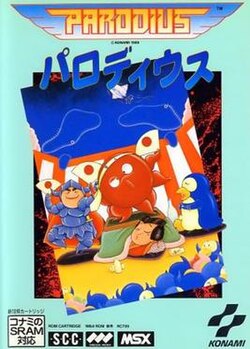This article needs additional citations for verification .(June 2025) |
| Parodius: The Octopus Saves the Earth | |
|---|---|
 | |
| Developer(s) | Konami |
| Publisher(s) | Konami |
| Composer(s) | Kinuyo Yamashita |
| Series | Parodius |
| Platform(s) | MSX, mobile phone |
| Release | MSX
i-mode
|
| Genre(s) | Scrolling shooter |
| Mode(s) | Single-player, multiplayer |
Parodius: The Octopus Saves the Earth [a] , also known as Parodius, is a 1988 horizontally scrolling shooter video game developed by Konami for the MSX. It is the first title in the Parodius series, although it is often confused with its sequel Parodius! From Myth to Laughter . The name itself is a portmanteau of "Gradius" and "Parody" and, eponymously, the game is a parody of the Gradius series of space-based horizontally scrolling shooters. Many of the characters and enemies are derived from that famous shooter series, while other elements are extracted from other Konami titles, such as Antarctic Adventure and TwinBee . This game is of particular note in the series as being heavily infused with Japanese culture and folklore.